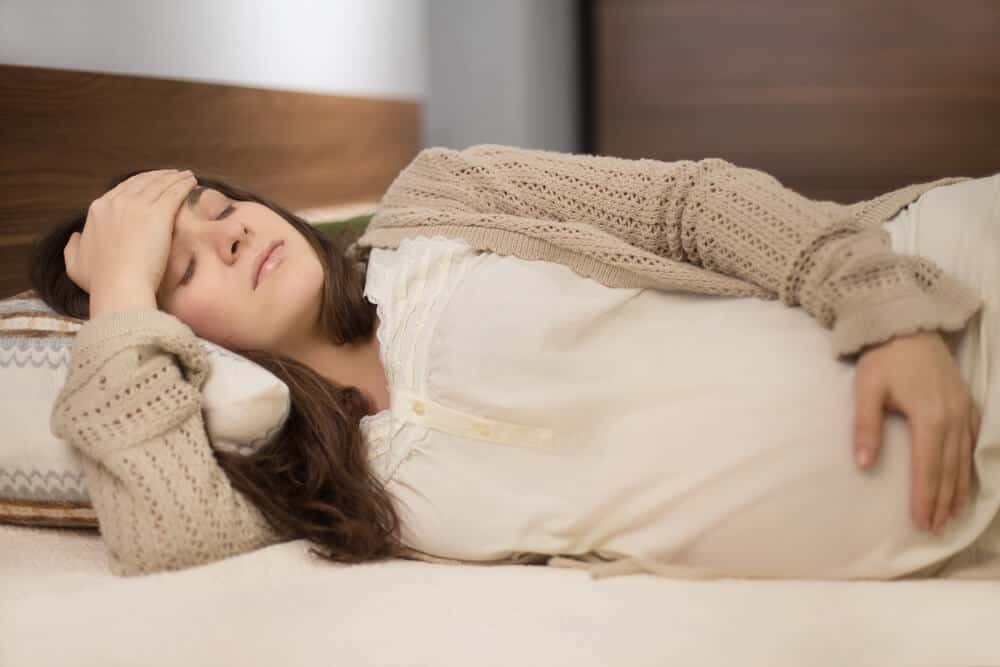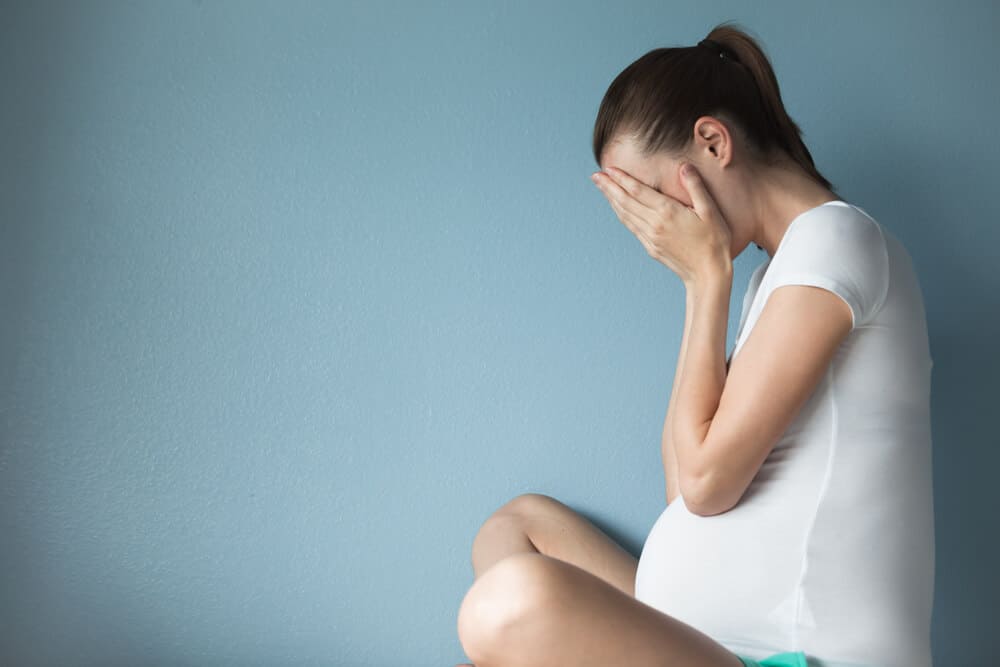
Depression is a surprisingly common illness which affects how we think, feel and act. Around 6% of all women are likely to experience depression during their lives at some point, but the number increases to 10% in pregnant women.
Women have a greater risk of depression during pregnancy due to the hormonal changes that affect the chemicals in the brain. All-too-often, though, pregnant women fail to realize they’re depressed and so fail to seek the help they desperately need.
The good news is that it’s possible to treat depression, even during pregnancy, and getting depression treatment is vital since depression can be bad for your pregnancy, causing both you and your baby problems.
Depression – An Unrecognized Pregnancy Complication
Many of the symptoms associated with depression, such as sleep pattern changes, low energy levels, reduced libido, and reduced appetite are all very similar to the symptoms associated with pregnancy. Therefore, many women, and even their healthcare providers, attribute those symptoms to pregnancy as opposed to depression.
Many depressed pregnant women are also quite reluctant to discuss their mental health during pregnancy because of the possible stigma they may experience. There is also a greater tendency to focus primarily on the physical health of a pregnant woman that her mental health, and that often leads to the condition being largely overlooked.
Depression In Pregnancy – The Risk Factors
There are several risk factors associated with pregnancy-related depression including:
- Life stress
- Anxiety
- A history of depression
- Unintended pregnancy
- A lack of social support
- Having a violent partner
The Symptoms And Signs Of Pregnancy-Related Depression
The symptoms and signs of depression in pregnancy are identical to those occurring with depression in those who aren’t pregnant. These include:
- Appetite changes such as feeling unable to eat or bingeing to excess
- Sleep changes- struggling to sleep at all or sleeping for extended periods
- Low energy
- Feeling worthless, hopeless or sad
- Crying for no apparent reason
However, there are a few extra clues that could indicate pregnancy-related depression including:
- Extreme anxiety about the baby
- Poor self-esteem and feeling inadequate about becoming a parent
- Inability to derive pleasure from previously enjoyable activities
- Failing to adhere to prenatal care regimes
- Poor response to reassurance
- Lack of weight gain because of an inadequate or decreased diet
- Drinking alcohol, using drugs or smoking
- Suicidal thoughts
It is also more likely for depression to occur in the first trimester and third trimester.
Will Depression In Pregnancy Harm My Baby?
Although depression is a mental health condition rather than a physical one, that doesn’t mean it won’t cause harm to your unborn baby. If depression goes untreated it may have potentially dangerous consequences for both you and your baby.
Some pregnant women turn to smoking, drug-taking or drinking alcohol as a way of helping them to cope with their depression, and clearly, these behaviors can cause harm both to the woman herself and her unborn baby. Premature births, low birthweight and ongoing development problems are all risks associated with such behaviors in pregnancy.
Women who are depressed may also fail to care for themselves properly. This can lead to poor nutrition that can result in a low birthweight baby with health issues. Women who are extremely depressed may even experience suicidal thoughts, and clearly this poses a risk to an unborn child.
Babies who are born to depressed mothers are also more likely to experience problems after the birth. They may be less attentive and active, and have greater restlessness and agitation than those born to mothers without depression. They may also cry more, and this can be difficult to cope with, exacerbating the depression still further.
Pregnant women with untreated depression may also have children who have behavioral issues as well as delayed language and cognitive development. Again, this is hard for anyone to cope with and can cause depressive problems to worsen.
Women who suffer from depression during their pregnancy may also struggle to bond properly with their newborn after the birth and may find it hard to respond properly to their baby’s needs. This early bonding experience is vital for the baby’s long-term development, so getting treatment quickly is important.
Why Should I Get Treatment For My Depression In Pregnancy?
If you fail to get treatment for your depression when pregnant both you and your unborn baby can suffer. Depression in pregnancy is linked to sub-optimal prenatal care as well as poor nutrition. This means your baby may not get the nutrients it needs to grow and be healthy, and you may not have enough energy to properly care for yourself. The result can be a poor outcome to your pregnancy, with pre-term labor, health problems for your newborn and even miscarriage being risks. You also have an increased chance of developing postpartum depression and struggling to bond with your newborn. New mothers suffering from depression can find it card to care properly for their little one. They often don’t want to spend any time with the baby and this can lead to excessive crying which only worsens the problem. Since postpartum depression can last for many months after the birth it’s important to get help before this problem arises.
Why Is Depression Common In Pregnancy?
For most women, pregnancy is an emotional experience. The hormones related to pregnancy affect the emotions and cause physical symptoms that make you feel miserable and unwell. Feeling sick all the time, struggling to sleep and experiencing physical discomfort can all exacerbate the problem when feeling down.
Antenatal depression is even more common in women who have previously suffered from depression or anxiety, or who are going through a challenging time in their lives such as divorce or bereavement. If you lack support from your friends or family or if you have experienced violence or domestic abuse, you are also more at risk. Nevertheless, many women fit into none of these categories and still suffer from depression during their pregnancy. It may happen unexpectedly and can affect women from every walk of life. Sufferers often feel ashamed or alone, but if you feel this way you should not be afraid to seek support.
Talking To A Medical Professional
The first thing you should do is approach your doctor, midwife or other healthcare provider. Many women feel guilty or distressed about feeling low during pregnancy – after all, it’s a time in their life when they feel as if they’re expected to be happy. However, no healthcare professional will judge you for your feelings. They all know that depression is simply a mental health problem that isn’t your fault and isn’t something you can just move on from or get over. They can, instead, help you to get the right support and treatment for you so you will be able to take better care of yourself and also your unborn baby.
Perhaps you’re struggling to discuss your feelings and thoughts about depression with your doctor. If this is the case for you, write down the things you wish to say or take a supportive person with you who can give you some comfort during the process. The most important thing is letting somebody know about how you’re feeling so you can find the best help for you quickly.
If you’ve previously suffered from depression or a mental health disorder make sure you tell your healthcare professional about it at your first prenatal appointment. This will ensure that they will be aware of possible problems that could arise and get support in place for you at an early stage so the chances of getting depression again are reduced.
How Can Depression In Pregnancy Be Treated?
Usually, treatment for depression involves a mix of medicines, talking therapies like CBT (Cognitive Behavioral Therapy or counseling) and self-help. However, every woman is different. Therefore, treatments that work well for one woman may not work for you. You need to see a doctor who can help you to decide which options work best for your needs. You may also need to visit a mental health professional who specializes in pregnancy-related depression for close monitoring during your pregnancy and in the postpartum period.
A healthcare professional will help you to decide which options work best in your situation, explaining all the benefits and risks of each option available to you. They will talk to you about several things including:
- What would be best at your stage of pregnancy
- The possible risks that medication could present to your unborn baby
- The chances of you becoming unwell again if you stop taking or don’t take medication
- The severity of your symptoms
- Whether or not you’ve been depressed before
- How well medication has been working for you so far if you already take antidepressants
When it comes to antidepressant medications, it’s important to discuss with your doctor the possible risks of continuing your treatment during pregnancy including what is already known about the safety of your specific medication for use in pregnant women, whether or not your baby will experience symptoms when born and whether breastfeeding could help to avoid these symptoms from arising. Some newborns experience symptoms like tremors, rapid breathing, poor feeding and irritability if their mother took antidepressants when pregnant. The good news is that those symptoms are usually very mild and will pass rapidly, generally within a couple of weeks, and serious issues are extremely rare. If your baby is born with symptoms, he will be closely monitored to ensure he is healthy before being allowed to go home with you.
Some pregnant women prefer to stop taking their medication during pregnancy. However, before stopping taking any medication for depression you should speak to your doctor first. Medication may be the best option for you, so you should discuss with your doctor the reasons you want to stop taking your medication and find out whether there are any possible risks in continuing to take it before making a final decision. If you understand the possible risks and decide that stopping taking your medication is the right choice for you, you can talk to your doctor about other options for managing your symptoms like having counseling or CBT.
Self-Care For Depression In Pregnancy

Depression often makes you feel as if you’d rather hide away and do nothing, but you need to take good care of yourself when suffering from this mental health condition, and this is especially the case if you’re pregnant. Here are some self-care tips to help you look after yourself if you’re experiencing depression during pregnancy:
- Begin with little activities, taken at your own pace.
- Don’t be afraid to ask for help should you need it.
- Talk to a trusted person like a partner, friend or family member about the way you’re feeling.
- Avoid feeling ashamed, guilty or embarrassed. The way you feel isn’t your fault.
- Eat well, even if you’re not feeling hungry.
- Take more exercise. Staying active helps to release endorphins that make you feel good.
- Avoid smoking and alcohol. Not only will they potentially harm your unborn baby but they will also make you feel even worse.
- Avoid taking St John’s Wort as a depression treatment. While it can be helpful in treating depression in women who aren’t pregnant it isn’t yet known whether it’s safe for use in pregnancy.
- Plan ahead for the emotional changes that will occur after you give birth and get a support plan in place.
- Be kind to yourself. Pamper yourself from time to time and take the time to do the things you enjoy.
Pregnancy isn’t always the happy, easy time that many women think it should be. It can be stressful, uncomfortable and hard work. If you’re experiencing depression during your pregnancy, you aren’t alone. It’s important to get the help that you need so you can avoid any unwanted problems or complications, either during your pregnancy or in the postpartum period. With support and treatment, you can avoid lasting issues that could affect your unborn baby’s health or cause a poor bonding experience once your little one is born.
Contact The Meadowglade for more information about how we can help you!
